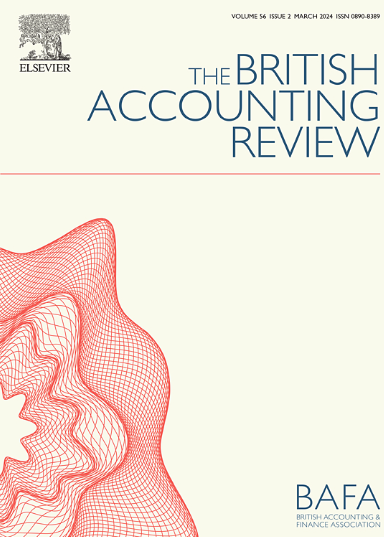在混合型组织中构建问责制的行动者——以瑞典市政公司为例
IF 5.5
3区 管理学
Q1 BUSINESS, FINANCE
引用次数: 0
摘要
应对问责挑战是混合型组织中的行动者如何理解其对不同利益相关者群体所负责任的一个重要部分。我们借鉴制度理论和逻辑视角,探讨了瑞典一家市政住房公司的战略顶点如何构建与其中出现的紧张关系相关的问责制。我们的案例研究强调,战略顶点通过唤起原则的过程来应对与多重问责逻辑相关的挑战。鉴于法律所有者的不可见性,战略顶点通过谈判资源分配、妥协和利益一致以及创建团队结构等额外过程来唤起委托人。我们的研究结果为有关混合型组织如何构建问责制和管理相关挑战的新兴文献做出了贡献。此外,我们对个体行动者和团队如何处理问责领域中个体行动与集体行动之间的紧张关系进行了分析,从而推进了当前对混合型组织中这些行动者应对问责挑战的过程的了解。本文章由计算机程序翻译,如有差异,请以英文原文为准。
Actors constructing accountability in hybrid organisations: The case of a Swedish municipal corporation
Coping with accountability challenges is an essential part of how actors in hybrid organisations make sense of their responsibility to distinctive groups of stakeholders. Drawing on institutional theory and a logics perspective, we explore how the strategic apex in a Swedish municipal housing corporation constructs accountability in relation to the tensions that arise therein. Our case study highlights that the strategic apex deals with the challenges associated with multiple accountability logics via the process of evoking the principals. Given the invisibility of the legal owner, the strategic apex evokes the principal(s) through the additional processes of negotiating resource allocation, compromising and interest alignment, and creating team structures. Our findings contribute to the emergent literature on how hybrid organisations construct accountability and manage related challenges. Furthermore, our analysis of how individual actors and teams deal with the tension between individual and collective actions in the accountability domain advances current knowledge of the processes through which these actors cope with accountability challenges in hybrid organisations.
求助全文
通过发布文献求助,成功后即可免费获取论文全文。
去求助
来源期刊

British Accounting Review
BUSINESS, FINANCE-
CiteScore
8.60
自引率
3.90%
发文量
39
审稿时长
76 days
期刊介绍:
The British Accounting Review*is pleased to publish original scholarly papers across the whole spectrum of accounting and finance. The journal is eclectic and pluralistic and contributions are welcomed across a wide range of research methodologies (e.g. analytical, archival, experimental, survey and qualitative case methods) and topics (e.g. financial accounting, management accounting, finance and financial management, auditing, public sector accounting, social and environmental accounting; accounting education and accounting history), evidence from UK and non-UK sources are equally acceptable.
 求助内容:
求助内容: 应助结果提醒方式:
应助结果提醒方式:


